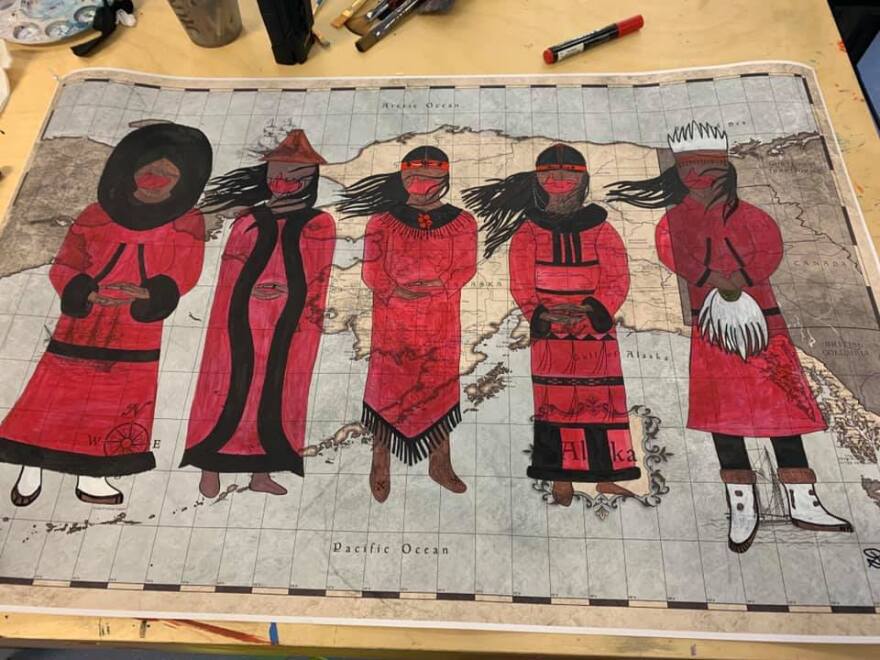During a virtual discussion August 27, hosted by the American Public Health Association, the director of a newly formed Indigenous-led non-profit talked about Missing and Murdered Indigenous People and why Indigenous data sovereignty is so important in Alaska.
Charlene Aqpik Apok is the executive director of the Alaska-based Data for Indigenous Justice.
She says the non-profit seeks to reclaim and consolidate data that was largely incomplete – and move toward data sovereignty -- by putting data in the hands of Indigenous communities: “Every single case deserves justice.”
A few years ago, she says, local organizations wanted to call attention to the rates of Missing and Murdered Indigenous Women and Girls in Alaska. Organizers wanted to read the names of those loved ones.
“The beginning of the database started because we ... wanted to call for justice and it didn't have anything to work off of,” Aqpik said.
Part of the problem is that federal, state and local agencies all track cases differently, and that creates discrepancies in the data – something Aqpik calls “data gaps.”
So, organizers like Aqpik began to compile a community-sourced list of cases. And it’s led to collaborations between organizations like Native Movement, Native Peoples Action and the Alaska Native Women’s Resource Center, which have worked together to help communities address the cases.
“Our community knows better than anyone. The case and the reality of which we're dealing with this,” Aqpik said. “The database Data for Indigenous Justice has, I think, one of the most comprehensive amounts of data for the state of Alaska, because it's informed by the community that fills in the gaps of where system issues have persisted.”

States and municipalities often have their own police departments. A lack of a broad, federalized law enforcement creates “gaps” in which information -- on a missing persons case, for example – may or may not get shared between agencies.
Alex Cleghorn is the policy director at the Alaskan Native Justice Center, and cites a 2018 Missing and Murdered report that indicates these data gaps.
“Part of what they were finding was that states or local police departments were not keeping track of race in a way that allowed some transparency into whether or not there was disproportionality in people who were missing and murdered.”
Data for Indigenous Justice is likely the first Indigenous-led effort to collect Missing and Murdered data in Alaska. Cleghorn says a couple of national Indigenous initiatives -- such as the Urban Indian Health Institute and the Sovereign Bodies Institute -- also look at community data from different perspectives.
“Without an overarching framework for people to report this data, there are going to be data gaps," Cleghorn said. "And then the on-the-ground element of it, there are these individuals who are often gathering the data too, whether or not that person is receiving the report, believes whether or not it's credible, or checks the right boxes is going to impact our ability to have good data about what's going on.”
Cleghorn says he’s heartened to see the different groups give attention to public safety in Alaska – and particularly to the issue of Missing and Murdered.
“I think that that kind of sustained attention and making sure that we're talking about it in every venue we can, and encouraging and asking our representatives to help address this issue," he said. "I'm hopeful that we will, if we put our heads together, come up with a good way to address this."
Apok says that Data for Indigenous Justice also helps communities file Freedom of Information Act requests with various agencies to collect their own data.
“The purpose of our organization is really to steward and care for all of the data regarding our Missing and Murdered Indigenous Persons in our Alaska Native community,” Aqpik said. “We do this through stewardship and we do that with a lot of cultural values and respect and honoring our ancestors past and present in all of the work that we do.”
Aqpik says multi-level partnerships with state and federal agencies are incredibly valuable. But she stresses how important communities are in gathering data – and how important that cultural understanding is when gathering that information.
“It's not just numbers. It's not just statistics, but it's our stories," she said. "It’s the stories of our life. It’s the story of our truths that we share as families, that we share as a collective.”
Data for Indigenous Justice is just one of the many grass-roots community-based solutions in Alaska. The federal initiative Operation Lady Justice announced in August that it officially opened its Alaska office in Anchorage.
The Alaska office is one of seven that will operate around the U.S.






